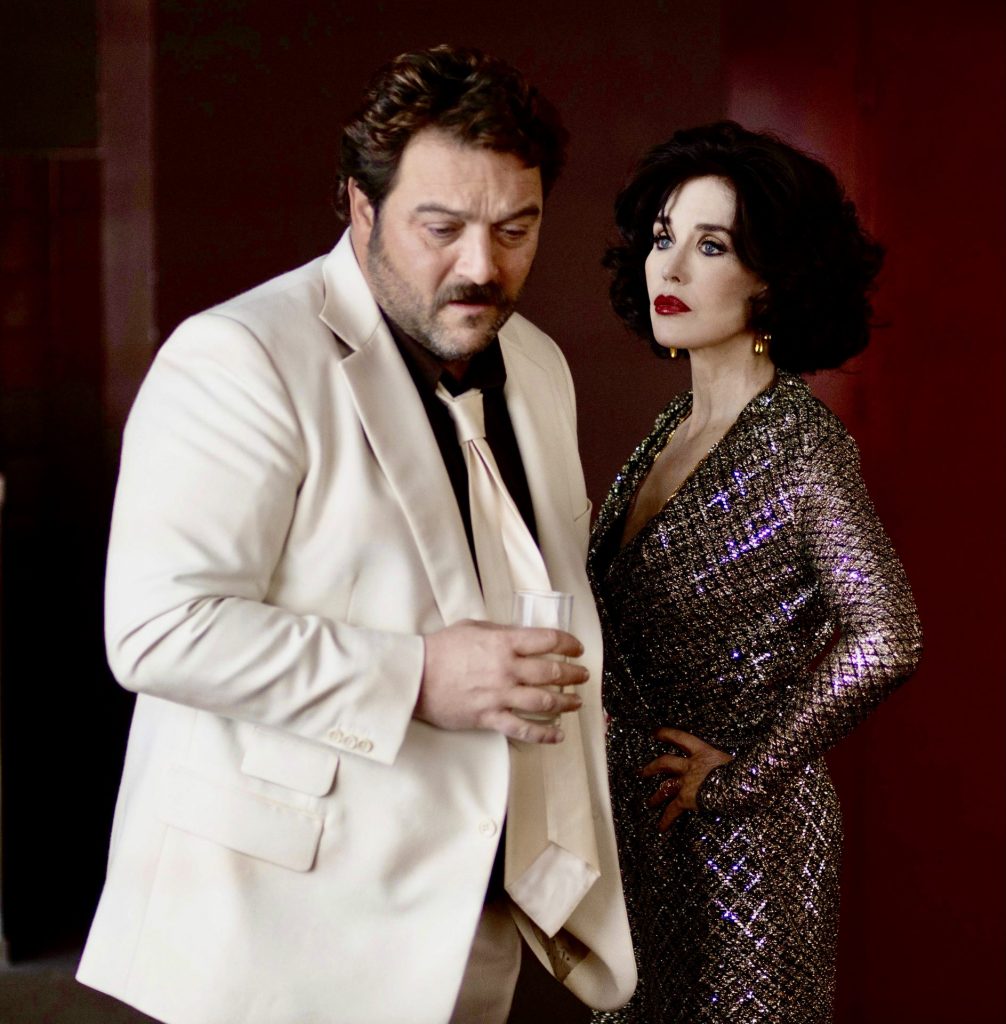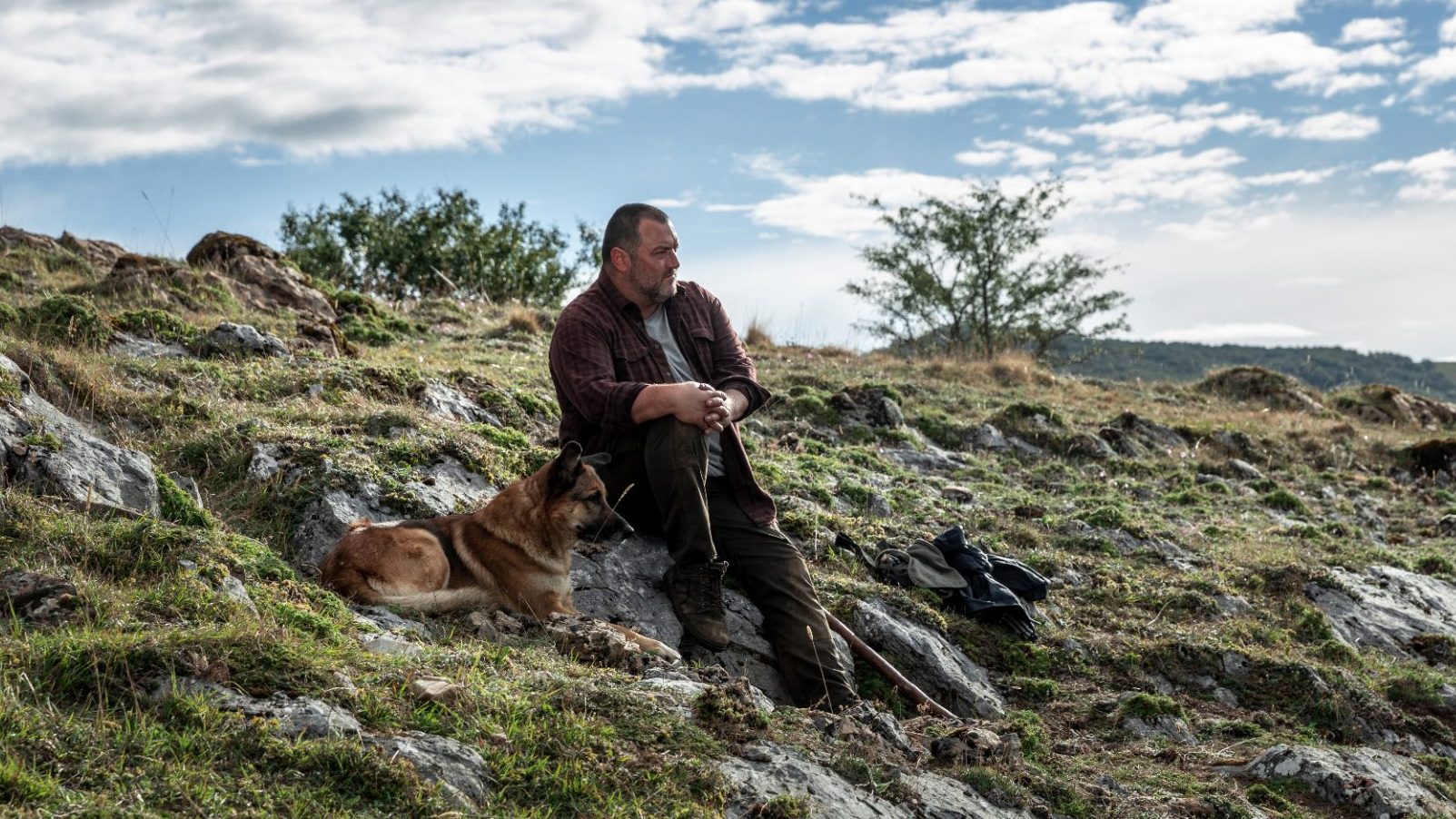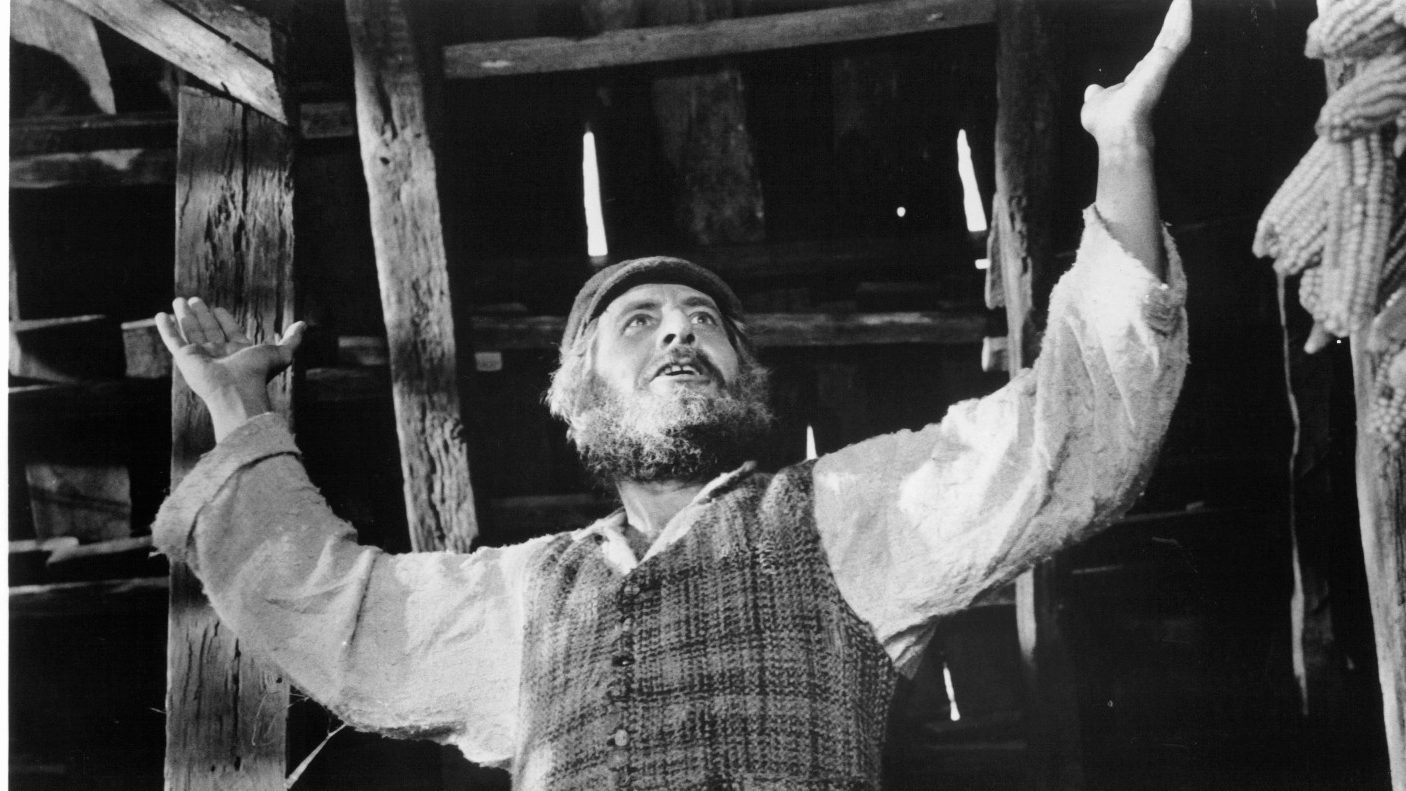You might not know the name but you’ll know his face from one of the greatest opening scenes in all of 21st-century cinema; the face that led Quentin Tarantino to call him “the French Robert Mitchum”.
With its heavy eyes and impassive jaw, the face of Denis Ménochet seared itself into movie legend in 2009, when Colonel Hans Landa (played by Christoph Waltz) arrives at the farm of Frenchman Perrier LaPadite, to sniff out a Jewish family he suspects are being hidden under the floorboards.
Who were these actors that Quentin Tarantino had found for the start of Inglourious Basterds? They looked familiar, experienced, obviously, and yet completely unplaceable, even for seasoned watchers of European movies. And what a superb scene of intensity, tension and threat they all conjured up.
It remains perhaps the quintessential Tarantino thumbnail, that opening. It did wonders for Waltz, a European actor who’d been jobbing in TV and film for years – he won an Oscar. The French guy, not so much.
In fact, apart from the SAG ensemble award he claimed as part of the garlanded Inglorious cast in 2010, it took Ménochet, now 46, until last month to gain major acting recognition, when he became the first non-Spanish performer to win best actor at Spain’s annual movie gong show, the Goyas.
“It was very embarrassing,” he tells me. “I learned Spanish for the role but I got up on stage and realised I’d forgotten almost everything. I just about remembered ‘Gracias’, so I said that. A lot.”
Ménochet speaks perfect English. The last time I saw him, he was living in London, in Maida Vale, where he’d been for eight years trying to cash in on what he calls his “Tarantino momentum” and so, when we Zoomed last week, I was surprised to find him in the Brittany countryside. Turns out he’s a bit surprised about it himself.
He tells me he left his London flat just before the pandemic to start shooting a film in Italy (White Paradise, co-starring recent guest on these pages, Zar Amir Ebrahimi) and couldn’t get back. Lots of his stuff is still there and he has still not returned.
Visiting family, he elected to put down some roots by doing up a farmhouse in Bretagne. Turning his computer around, he shows me the view from the window: miles of green fields, glowering clouds, little stone walls and, in the distance, the sea.
Curiously, he’s therefore not unlike his prize-winning character Antoine in As Bestas (The Beasts), the film by Spain’s Rodrigo Sorogoyen which scooped, alongside Denis’ award, eight more Goyas at the ceremony in Seville, including best director and best film. In the movie, Denis and French veteran Marina Foïs (who’s also superb in it, but who lost out to Spanish star Laia Costa at the Goyas) are middle-class teachers from France who opt to settle in rural Galicia to set up an organic farm and to restore ruined barns for holiday homes, starting with their own stone pile.
Chasing the rural idyll is clearly hard work, though worth it for those nights at the end of a back-breaking day’s labour, when the couple can sit in their chairs and puff on a spliff under the stars and enjoy a nibble of fresh chorizo.
Market days prove popular – their tomatoes and leeks are in particular demand – but when Antoine visits the village bar for Esposito’s tapas and some rough wine, he finds it tough to break into local circles. Despite his best efforts to learn the local Spanish dialect – Ménochet had to take it phonetically and it seems to me he does pretty well – he meets gruff opposition from an influential pair of local brothers, Xan and Lloren, furious that Antoine had the right to veto offers from an energy giant who would love to buy up their ancient land to put wind turbines on the deep green hillsides where goats and cattle graze.
Gripping, chilling and brutal, the film becomes a classic battle of wills, mixing home invasion horror with elements of homestead western, even veering into Straw Dogs territory. The main confrontation is between Antoine and the surly, stubborn, sinister Xan, played so well by Luis Zahera that you’d be forgiven for thinking he was a local non-professional, plucked from the Galician mud.
“He’s very experienced and very well-known,” says Ménochet. “I rehearsed with him all the time, to get the language he was speaking, both in his body and the dialect. He was a huge help to me. But he could also scare the hell out of me.”
Antoine was literally a role to die for. Recalling Zahera’s commitment to the part of the vengeful Xan, Ménochet tells me of a crucial fight scene during which he actually passed out from his acting partner’s stranglehold. “I don’t remember much except coming around with an oxygen mask on my face and seeing Luis, holding my hand, his face pale like a ghost, thinking he’s killed me, praying ‘por favor dios mio, dios mio…’ You know what, it was worth nearly dying for in the end.”
Ménochet is fully committed to the part of Antoine, the way Antoine is committed to his land and his project. He sweats, grunts and huffs and puffs his way across the screen, in drenched T-shirts and muddy boots. He’s like one of the bulls panting in the paddock.
He smiles as he admits to being uncomfortable with his weight. “I look enormous, and it’s my fault,” he says. “I ate and drank like a pig through lockdown and I can’t lose it and it’s bugging me. I promise to go on a diet all the time. Actually, I started five days ago, so we’ll see…” How is he doing so far? “I’m fucking starving,” he belly laughs.
Like it or not, Denis is a big presence on screen. There aren’t many actors like him. For all his bullish, beastly heft he can also be beautifully light on his feet, as evidenced by his recent role for François Ozon, in Peter von Kant, which opened the Berlin Film Festival last year and in which he played a German film director based on Rainer Werner Fassbinder, trapped in a big flat, snorting coke with Isabelle Adjani, preying on pretty young actors and trying to bash out a script with his moustachioed amanuensis Karl. It’s a deliciously fruity role in a typically camp and enjoyable Ozon folly.

Ménochet also worked with the prolific Ozon in the atypical 2018 drama By the Grace of God (Grâce à Dieu), which told the real-life case of serial child abuse in the Catholic Church in Lyon and the men who came forward to confess their long-buried childhood traumas.
“Both films were fabulous but so different to work on,” says Ménochet. “For Peter von Kant, I had to learn so many lines, which was tough for me but I worked with Adjani, and [Fassbinder star] Hanna Schygulla who is such a legend, and it was a very freeing role for me. Grace of God was a very important film, though, because we were dealing with real people and deep, political issues and the Church tried to stop the film when we were all gathered there for the premiere in Berlin, and we all were aware that what was happening around the film and how showing it would be changing people’s lives, I think we all bonded on that film and became very close, probably linked together for life.”
Despite making his impact in a Tarantino movie, Ménochet has yet to break through in English-language movies. He is as puzzled by it as I am. Perhaps he should have moved to LA rather than London? “Oh no, I always wanted to be in British films. I loved them when I was a student – my drama teacher was a Brit in Paris and she taught us in English, so I fell in love with British acting and theatre. I love the British way of getting inside a text. It’s a method that’s very about the craft of acting, and I love that. So that’s where I wanted to be but it turns out they weren’t waiting for me with open arms. I don’t care. I loved living there.”
His hero, Ménochet says, is Anthony Hopkins, revealing that the Welshman’s films, from Magic to The Remains of the Day to The Father, provide constant inspiration in the way Hopkins can transform his whole body with just a change of smile or angle of the head.
Yet despite Ménochet’s efforts to break into British film – he has appeared in some TV, such as Spotless – he remains best known for that one scene in Inglorious Basterds.
He recounts, after many rejections and many part-time jobs, including working as a bartender, a delivery driver and in a skate shop, how he got the big break. Having just missed out on a role in La Vie En Rose which won Marion Cotillard an Oscar and having once blown an audition for The Da Vinci Code with Ron Howard through nerves, he remembers going to see Tarantino in a little flat on the Rue de Rivoli on Christmas Day after rehearsing for 48 hours on his own in front of the mirror. But the trick to getting the part, he says, was not all in the acting.
“I’d just read an interview with Jean Reno who said he only started to get parts when he shut up in auditions, so the trick was you don’t say anything except when you’re acting. So I said nothing, and a week later, I get a call to say I got the part.”
Had he been talkative, Denis says, he would certainly have blown it because in the part of Perrier LaPadite he saw his grandfather André, who had fought in the French Resistance after being captured by the Germans. “If I’d spilled all that information, I just know I would have been too much. So I kept quiet and I thought of my grandfather as I played the part and here we are.”
You can spot him, too, in Wes Anderson’s confection, The French Dispatch, as jailer to Benicio del Toro (the only other non-Spaniard to have won that Goya best actor award) – a film, he says, that was like being stuck in the Christmas window display of Parisian department store Galeries Lafayette.
The irony does not escape him. Having tried to break into English-language movies, Denis never quite appears like the cliched Frenchman casting directors are looking for. So, of course, his biggest international accolade comes when he starts being a farmer again, this time speaking Spanish.
“You never really know what’s around the corner,” he says. “I take my time, I eat too much, but that’s me. I also watch a lot of films so I know what’s going on. So I’m learning, for an actor to be great as somebody else, you have to first be yourself.”
The Beasts is in UK cinemas from March 24 and on Curzon Home Cinema
THE TNE FILM CLUB
26. IN THE HOUSE, directed by François Ozon (2012)
Here’s an overlooked but masterful François Ozon gem, also featuring Denis Ménochet, and showcasing two superb performances from Fabrice Luchini and Kristin Scott Thomas. Loosely based – many of Ozon’s films are almost unrecognisable from their inspiring source material – on Spanish play The Boy in the Last Row, it’s set in a French high school where Luchini is a fastidious and haughty literature teacher. When he discovers a gifted pupil worthy of his dedication, he encourages 16-year-old Claude to chronicle his obsession with a fellow pupil’s bourgeois family, particularly the gorgeous Mum, played by Emmanuelle Seigner. It leads to psycho-sexual voyeurism, literary exploration, and neurotic professional and marital breakdown, all superbly orchestrated by Ozon at the height of his wittily intellectual, polymorphously perverse cinematic powers.




